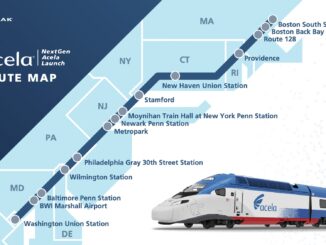WASHINGTON — Again showing strong demand for passenger trains in 46 states, Amtrak announced today it has set a ridership record for Fiscal Year 2004: 25,053,564 passengers rode Amtrak trains in the period October 2003 through September 2004.
That figure is an increase of 4.3 percent and exceeds by more than one million passengers the previous record of 24,028,119 set in Fiscal Year 2003.
“We are very happy with our ridership numbers. The increases have been across all our services – corridor trains as well as long-distance trains,” said David L. Gunn, Amtrak President and Chief Executive Officer. “The numbers show that people like their trains, and our challenge over the near term is to keep our costs under control while improving the service for our passengers.”
The ridership increases are especially noteworthy because they came during efforts to restore the fleet, bring Amtrak facilities back to a state of good repair and while several major service disruptions occurred.
The series of tropical storms and hurricanes across Florida and the southeast in August and September led to the cancellation of 147 trains, with another 178 trains truncated or operated short of their destinations. The four daily round-trips to Florida by the Silver Star, Silver Meteor, Auto Train and Palmetto represent more than a third of Amtrak’s long-distance business.
In addition, the Silver Meteor was unable to operate in parts of April, May and June because part of the route it uses was taken out of service by CSX Transportation for scheduled track work.
A portion of the Los Angeles-Seattle Coast Starlight route owned by Union Pacific Railroad was out of service for nearly two weeks because of a tunnel problem. During that time, 19 trains were truncated. Also on the west coast, San Joaquin Service between Oakland and Bakersfield was disrupted for Burlington Northern Santa Fe Railway track work scheduled in January and for unscheduled repairs in June.
Political conventions in Boston and New York resulted in reduced ridership; train trips through New York City declined 27 percent during the days of the Republican National Convention.
Despite those issues and significant delays operating over many congested sections of freight railroads outside the Amtrak-owned northeast corridor, ridership rose by 4.4 percent on short distance services and increased by 3.3 percent on long distance trains.
The premium Boston-New York-Washington Acela Express showed a ridership gain of 8.7 percent.
Published in the November 2004 edition of The Cross-Tie.



